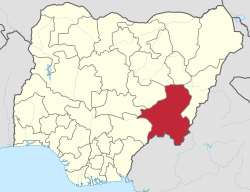Taraba State
| Taraba | |
|---|---|
| State | |
| Nickname(s): Nature's Gift to the Nation | |
 Location of Taraba State in Nigeria | |
| Coordinates: 8°00′N 10°30′E / 8.000°N 10.500°ECoordinates: 8°00′N 10°30′E / 8.000°N 10.500°E | |
| Country |
|
| Date created | 27 August 1991 |
| Capital | Jalingo |
| Government | |
| • Governor (List) | Darius Dickson Ishaku (PDP) |
| • Senators |
|
| Area | |
| • Total | 54,473 km2 (21,032 sq mi) |
| Area rank | 3rd of 36 |
| Population (1991 census) | |
| • Total | 1,480,590 |
| • Estimate (2005) | 2,688,944 |
| • Rank | 30th of 36 |
| • Density | 27/km2 (70/sq mi) |
| GDP (PPP) | |
| • Year | 2007 |
| • Total | $3.40 billion[1] |
| • Per capita | $1,446[1] |
| Time zone | WAT (UTC+01) |
| ISO 3166 code | NG-TA |
| Website | services.gov.ng/taraba |
Taraba is a state in Nigeria, named after the Taraba River which traverses the southern part of the state. Taraba's capital is Jalingo.
History
The state was created out of the former Gongola State on 27 August 1991, by the military government of General Ibrahim Babangida.
Geography
Taraba State is bounded in the west by Nasarawa State and Benue State, northwest by Plateau State, north by Bauchi State and Gombe State, northeast by Adamawa State, east and south by Cameroon.
Taraba State lies largely within the middle of Nigeria and consists of undulating landscape dotted with a few mountainous features. These include the scenic and prominent Mambilla Plateau. The state lies largely within the tropical zone and has a vegetation of low forest in the southern part and grassland in the northern part. The Mambilla Plateau with an altitude of 1,800 meters (6000 ft) above sea level has a temperate climate all year round.
Rivers Benue, Donga, Taraba and Ibi are the main rivers in the state. They rise from the Cameroonian mountains, straining almost the entire length of the state in the North and South direction to link up with the River Niger.
Local Government Areas
Taraba State consists of sixteen (16) Local Government Areas (or LGAs). They are governed by elected chairmen. They are as follows:
Agriculture
The major occupation of the people of Taraba State is agriculture. Cash crops produced in the state include coffee, tea, groundnuts and cotton. Crops such as maize, rice, sorghum, millet, cassava, and yam are also produced in commercial quantity. In addition, cattle, sheep and goats are reared in large numbers, especially on the Mambilla Plateau, and along the Benue and Taraba valleys. Similarly, the people undertake other livestock production activities like poultry production, rabbit breeding and pig farming in fairly large scale. Communities living on the banks of River Benue, River Taraba, River Donga and Ibi engage in fishing all year round. Other occupational activities such as pottery, cloth-weaving, dyeing, mat-making, carving, embroidery and blacksmithing are also carried out in various parts of the State.
Culture
The government has made concerted efforts to improve areas of tourist attractions like Mambilla Tourist Center, Gumpti Park and game reserve in Gashaka; and the Nwunyu Fishing festival in Ibi, which is usually held in April of each year where activities such as canoe racing, swimming competition and cultural dances are held. Other festivals are Purma of the Chamba in Donga, Takum and jibu culture dance in Bali, the Puje of Jukuns, Kuchecheb of Kutebs in Takum and Ussa, Kati of the Mambilla and host of others. Taraba is called "Nature's gift to the nation" as the state is rich and have many ethnic groups, including Jenjo, jibawa, Kuteb Chamba, Yandang, Mumuyes, Mambila, Wurkums, Fulanis, Jukun,Ichen,Tiv,Kaka, Hausa and Ndola. A striking historical fact about the State is that it encompasses part of the Mambilla Region which is famed as the Bantu cradle, having been occupied for some five millennia to date (Schwartz, 1972; Zeitlyn & Connell, 2003).
References
- 1 2 "C-GIDD (Canback Global Income Distribution Database)". Canback Dangel. Retrieved 2008-08-20.